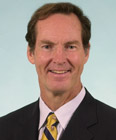Bruce H. Haughey, M.D., director of the Division of Head and Neck Surgical Oncology and professor of otolaryngology, has been named the first to hold the Dr. Joseph B. Kimbrough Chair in Maxillofacial Surgery and Prosthodontics in the Washington University Department of Otolaryngology for Teaching and Healing. Haughey is also a researcher with the Siteman Cancer Center and a head and neck surgeon at Barnes-Jewish Hospital and St. Louis Children’s Hospital.

The position was made possible by a bequest from Dr. Joseph B. Kimbrough, an 1894 graduate of the Washington University College of Dental Medicine. Kimbrough served on the Washington University dental school faculty, and he maintained a successful private practice for 61 years. He died in 1963 at the age of 93.
Mark S. Wrighton, chancellor of the University, and Larry Shapiro, M.D., executive vice chancellor for medical affairs and dean of the School of Medicine, announced the appointment of Haughey to the new position.
“Dr. Kimbrough’s generous gift to his alma mater will support our efforts in oral and facial reconstructive surgery and prosthodontics for those suffering the ravages of cancer,” Wrighton says. “His bequest will be a great assistance in retaining and attracting superior faculty for this important program so strongly rooted in dental medicine at Washington University.”
“Many of the sophisticated procedures now being used in this field could not even be considered in Dr. Kimbrough’s era, and we believe we honor Dr. Kimbrough’s memory through this forward-looking and life-enhancing work,” Shapiro says. “Bruce Haughey’s research and practice help people resume normal living after often devastating surgical procedures and embody both compassion and innovation.”
As director of the Division of Head and Neck Surgical Oncology in the Department of Otolaryngology, Haughey oversees a multidisciplinary group of specialists affiliated with the Siteman Cancer Center. They work in the areas of radiation oncology, medical oncology, radiology, pathology, dentistry, speech therapy, psychosocial support, dietetics, prosthetics and oral surgery and treat patients with all forms of head and neck cancer, including thyroid and skin cancers.
Clinical trials conducted in the division use new therapies for eradication of these cancers paired with the latest reconstructive techniques to restore voice, communication, swallowing and appearance. The surgeons have pioneered a number of minimally invasive and reconstructive procedures including reconstruction of the tongue, facial soft tissue (lip, cheek, forehead, or nose), voice-box and skull-base. Precise radiation targeting of tumors using Intensity Modulation Radiation Therapy to conform the radiation dose to the tumor and minimally invasive endoscopic laser surgery techniques also have been developed to markedly enhance patient survival, recovery and well-being.
Recent investigations by Haughey have focused on the difficult task of reconstructing areas of the pharynx, esophagus, mouth and tongue after surgery to remove cancerous tissue. His work aims to improve treatment protocols and to investigate more effective restoration of function and acceptance of reconstructive grafts. Haughey and his colleagues have been notably successful in reconstruction of the tongue after partial or complete removal.
“The tongue is a complex and specialized organ that performs many critical functions,” Haughey says. “It is needed for speech and word enunciation, it enables chewing and swallowing, and it protects the airways from swallowed food and liquids, which can cause serious pneumonias.”
Haughey led a study of patients who received tongue reconstruction, either of the front or base of the tongue. Tongue tissue was replaced with tissue from the patients’ forearms or thighs and constructed using a special folding technique developed by Haughey and his colleagues. After reconstruction, 85 percent of these patients were able to swallow. When the patients’ ability to speak intelligibly was tested, the average score for those with tongue base replacement was 98 percent intelligibility and for those with front of tongue replacement, was 76 percent intelligibility. The results exceeded those of studies by other groups.
Haughey earned both his undergraduate and medical degrees from the University of Auckland in New Zealand, graduating in 1976 from his medical program. He was an intern at Waikato Hospital in Hamilton, New Zealand and then became a trainee under the auspices of the Royal Australasian College of Surgeons in surgery and otolaryngology at Auckland Hospitals until 1981. At that time, he moved to the United States and furthered his study of otolaryngology and head and neck surgery at the prestigious University of Iowa Hospitals and Clinics in Iowa City. In 1984, he completed a fellowship in skull-base surgery at the same institution and earned a master of science degree in otolaryngology from the University of Iowa. Haughey has been with the School of Medicine since 1988.
Haughey is a fellow of the American College of Surgeons, the Royal Australasian College of Surgeons, the American Academy of Facial Plastic and Reconstructive Surgery, the American Society for Reconstructive Microsurgery, the American Academy of Otolaryngology, and a corresponding fellow of the German Society of Plastic and Reconstructive Surgery. His publications over the past twenty years demonstrate his commitment to the area of head and neck cancer treatment and reconstructive surgery. He is co-editor of the recently published fourth edition of “Otolaryngology—Head and Neck Surgery,” a four-volume, comprehensive textbook in the field. He sees patients daily at the Center for Advanced Medicine of Washington University School of Medicine and Barnes-Jewish Hospital.
Washington University School of Medicine’s full-time and volunteer faculty physicians also are the medical staff of Barnes-Jewish and St. Louis Children’s hospitals. The School of Medicine is one of the leading medical research, teaching and patient care institutions in the nation, currently ranked third in the nation by U.S. News & World Report. Through its affiliations with Barnes-Jewish and St. Louis Children’s hospitals, the School of Medicine is linked to BJC HealthCare.
Siteman Cancer Center is the only NCI-designated Comprehensive Cancer Center within a 200-mile radius of St. Louis. Siteman Cancer Center is composed of the combined cancer research and treatment programs of Barnes-Jewish Hospital and Washington University School of Medicine.